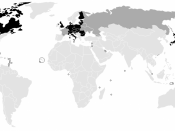The issue of whether or not Australia should adopt the Kyoto Protocol and limit its greenhouse gas emissions to 108% of its 1990 levels has been widely debated in our community. It is an important issue because it concerns the emission of an excess amount of greenhouse gases, such as carbon dioxide, due to anthropogenic activities. These gases have contributed to the effects of global warming by retaining a surplus amount of the sun's radiation in the atmosphere. This essay will consider the arguments both for and against Australia embracing the Protocol, and will conclude with a recommendation on whether or not the Protocol should be ratified by the Australian Government.
In 1997, 160 countries adopted the Kyoto Protocol in an attempt to reduce the effects of global warming, with the long-term aims of environmental protection and sustained economic growth in mind. The Protocol requires 38 developed countries (known as the Annex B) to collectively reduce 5.2%
of the worlds' 1990 greenhouse gas emissions levels by 2008 - 2012, but does not set any restrictions on developing countries. Each developed country was set various legally binding targets in regard to how they produce and use energy, levels of pollution and degrees of access to clean technology. Unlike most Annex B parties, which are required to reduce their emissions by up to 10%, Australia was given a generous target of only limiting its emissions to an 8% growth of its 1990 levels.
Although it is difficult to pinpoint the exact links between global warming and climatic change, there is little dispute that it is making matters worse. Professor Karoly, a co-author of the report, "Global Warming Contributes to Australia's Worst Drought", argues that, "The higher temperatures experienced throughout Australia last year are part of a national warming trend over the past...



Aust. Should Adopt the Kyoto Protocol's Recommendations
Very informative. I did not know much about the Kyoto Protocol and how important it was that Australia adopts it's protocols. But now I understand. This essay is very informative and clearly has been well researched. The language is simple and easy to understand.
0 out of 0 people found this comment useful.